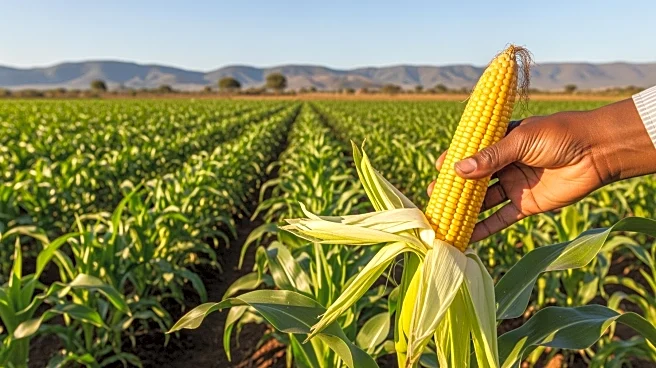What's Happening?
At the 6th Africa Resilience Forum held in Abidjan, agricultural experts emphasized the need for African governments to transform farmers from being recipients of food aid to becoming providers of food across
the continent. The forum, which took place from October 1 to 3, gathered policymakers and practitioners to discuss strategies for prevention and investments that promote peace in Africa. Roland Fomundam, CEO of GreenHouse Ventures, highlighted the importance of involving farmers in agricultural policy discussions, noting that agriculture is a dominant activity in crisis zones. Beth Bechdol, Deputy Director-General of the FAO, stressed the role of farmers as part of the private sector, advocating for better collaboration to improve producers' incomes. Abdihakim Yusuf Ali Ainte from Somalia's Prime Minister's Office shared Somalia's success in mobilizing private sector resources to enhance food security. Martin Fregene from the African Development Bank Group emphasized building on existing production systems and supporting small and medium-sized enterprises.
Why It's Important?
The call to transform farmers into food providers is significant as it addresses the root causes of food insecurity and promotes sustainable agricultural practices. By empowering farmers, African nations can reduce dependency on food aid and enhance self-sufficiency, which is crucial for economic stability and peace. The involvement of the private sector and the focus on existing production systems can lead to increased agricultural productivity and resilience against climate change. This shift can also improve the livelihoods of farmers, contributing to poverty reduction and economic growth. The forum's discussions highlight the need for innovative solutions and investments in agriculture, which are essential for achieving long-term food security and development goals in Africa.
What's Next?
The forum's outcomes suggest a need for continued dialogue and collaboration between governments, the private sector, and farmers to implement the proposed strategies. Future steps may include developing policies that support farmer-led initiatives, increasing access to financing and resources, and promoting education and awareness about the benefits of agriculture. Stakeholders are likely to focus on creating an enabling environment for farmers to thrive, which may involve infrastructure development, access to markets, and technological advancements. The African Development Bank Group and other organizations may play a pivotal role in facilitating these efforts and monitoring progress towards achieving food security and resilience.
Beyond the Headlines
The forum's discussions also touch on cultural perceptions of farming, with calls to change the narrative around agriculture as degrading work. By promoting farming as a valuable and respected profession, there is potential to inspire future generations to engage in agriculture, ensuring its sustainability. This cultural shift could lead to increased interest in agricultural education and innovation, fostering a new wave of agripreneurs who can drive economic growth and development. Additionally, the emphasis on peace-promoting investments highlights the interconnectedness of food security and stability, underscoring the importance of addressing both issues simultaneously.









